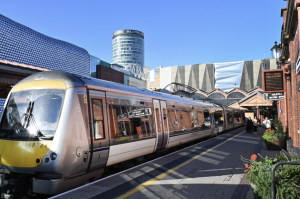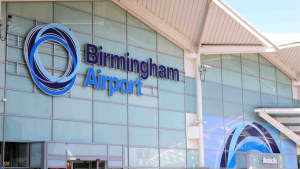Key review highlights need for major public transport investment in Birmingham

Birmingham is one of four city regions identified for public transport improvements in the government’s official infrastructure advisers’ latest report on the biggest priorities for the long term future of the country’s key networks.
The second National Infrastructure Assessment – a five yearly review conducted by the National Infrastructure Commission – sets out a programme of transformation for the country’s energy, transport and other key networks over the next 30 years.
Its recommendations include giving Birmingham a share of £22bn funding for major public transport schemes, with around two thirds of this investment focused on four priority city regions – Birmingham, Bristol, Manchester and Leeds. The remaining one third should be allocated to other cities where a strong case can be made on the basis of connectivity or capacity, says the Commission.
The assessment points out how just one third of Birmingham’s population can currently reach the centre of the city by public transport within 30 minutes – something the Commission notes is worse than for many European cities of a comparable size.
It also sets out the scale of expected passenger growth in future, with an estimated capacity gap of around 20,000 additional passengers unable to get into Birmingham city centre during the midweek peak by 2055.
The assessment says the scale of the West Midlands’ transport capacity need “is likely to justify investing in tram or rail based projects, although the exact type and mix of projects is a decision for cities to determine with government based on the costs and benefits. Given major scheme lead in times, project planning and business case development should proceed as soon as possible”.
Sir John Armitt, chair of the National Infrastructure Commission, said: “Growing the size and productivity of Birmingham will help rebalance the country’s economic geography as well as create more well paid jobs locally.
“Better public transport and easing traffic congestion is key to that. Greater Birmingham is one of four city regions with a clear case for significant government investment in a step change in transport capacity.
“While the way we travel around our big cities may change over time, keeping people moving affordably and efficiently is a key ingredient in economic growth and quality of life. Our recommendations to government set out a costed programme for delivering cleaner, faster travel, shaped by local leaders.”
Andy Street, Mayor of the West Midlands, said: “The Commission has worked closely with the West Midlands Combined Authority in developing its independent Assessment and we now look forward to working with them to ensure Government takes forward its recommendations.
“Building a world class transport system that connects local people to a plethora of opportunities is one of our region’s key priorities. The Commission’s endorsement of the economic case for transforming local public transport is both timely and welcome.
“Local leadership – armed with devolved funding – can play a major role in leading on the delivery of the long term infrastructure our nation very much needs. Whilst local leadership must of course be appropriately empowered – especially when it comes to regional infrastructure – inter regional connectivity requires national leadership to drive the infrastructure investment that will supercharge our productivity in the months and years ahead.”
The Commission suggests that the city regions benefiting from this transport investment should make a financial contribution of at least 15-25% of capital costs, and that a combination of mechanisms such as business rate retention and capture of land value increases should be considered.
Growing passenger capacity is best achieved by public transport, says the Commission, because it can convey commuters in a more space efficient way than cars, but this means peak time car travel will need to reduce in future to avoid congestion. The Commission suggests that once public transport improvements offer commuters a viable alternative for getting in and out of the city centre, city regions will need to find ways of reduce peak time car journeys. The Commission is clear that “the exact form and sequencing of the demand management scheme should be a decision for the individual city”.
Following government’s recent decision on High Speed 2 and noting the commitment to various new transport schemes, the Commission also calls for a new long term strategy that sets out how rail improvements will address the capacity and connectivity challenges facing the North and Midlands. The Assessment proposes an urgent review of rail priorities in for regions, involving local leaders, to produce “a rigorously costed portfolio of schemes with clear delivery timescales.”
The report stresses the need to accelerate the rollout of public charge points for electric vehicles to ensure that government’s expectation of 300,000 chargers by 2030 is met. This will require continued year-on-year grow of around 30 per cent for the next seven years. The Commission notes the importance of ensuring public charge points are spread across all regions of the country, to support every driver in making the switch.
The report draws on two years of analysis, expert engagement and public research, including a number of meetings with West Midlands Combined Authority and local business leaders.
The Assessment is upfront about the need for significant public and private investment in infrastructure if the UK is to rebalance its economic geography, meet climate obligations, improve resilience and enhance the natural environment.








